Muesli bars, granola bars, nut bars, snack bars - call them what you will. These portable snacks come in handy when you're pushed for time and need something to sustain you until your next meal. Likewise, they can also be a great option as a pre-workout snack to fuel yourself up before hitting the gym. It can be difficult to know what the best options are when it comes to healthy choices. To help you, here's a nutrition comparison to help you pick the best healthy muesli bar.
More...
It's quite common for regular gym-goers and active people to have a stash of snack bars somewhere around their home or office. Perhaps a box in the pantry, maybe one or two in your glove box in the car or in your gym bag. Possibly also that bottom drawer of your desk at work.
I'll often grab one at the airport while waiting for my flight up to site. I find it helps fill in the gap between having an early lunch and when I'll get dinner at my destination that evening.
They can make a great snack when you need to stave off hunger or just need a bit of pre-workout fuel.
Some of the more nutritious muesli bars can help keep you going, while others are little more than a sweet treat.
How do you know which brands and products are best though?
That's where my muesli bar nutrition comparison guide comes in.
Get the free comparison
Nutritional information for 243 different muesli bars available in your local supermarket
Types of muesli and granola bars available in supermarkets and convenience stores
Some snack bars available are genuine 'muesli' bars. That is to say, they comprise mainly oats or muesli.
On the other hand, many bars have yoghurt-based or chocolate coatings. Furthermore, some include nuts, some fruit, some both, some neither.
There are nut bars, fruit & nut bars, nut butter bars. Additionally, some bars available are based on puffed rice while others offer a more cake-like texture.
In general, if you're looking for a healthy muesli bar to help keep you going, here are a couple of tips:
Aim for a bar with more than half its ingredients comprising of a mixture of whole grains, nuts, seeds and/or fruit.
These ingredients will help you obtain good fats as well as incorporate often-needed fibre. What's more, the addition of dried can fruit can bring a welcome boost of sweetness.
READ ALSO: Easy ways to increase your fibre intake
On the other hand, if you're looking for more of a sweet train, perhaps look at a lower calorie muesli bar that still meets other healthy criteria.
Comparing how muesli bars, granola bars, nut bars and protein bars are marketed
Firstly, let's set one thing straight. Just because the label says it's a muesli bar, doesn't automatically make it healthy. After all, some bars on the market aren't that much different from a regular biscuit or cookie.
For this reason, some bars out there are best viewed as occasional treats. If your favourite bar has high saturated fat content (above 4-6g per bar) then it might be worthwhile switching. Likewise, bars with high sugar content might not benefit you as much as those with lower sugar levels.
Like with most things, it pays to check the nutrition information panel. However, this can often lead to more confusion.
Looking at serving sizes on snack bars
For the most part, serving sizes on supermarket snack bars reflect the content of the package. That is, for a bar with a net weight of 40g, the serving size listed on the label would be 40g.
Simple and straightforward, right?
Well, not always.
Let's take a look at Well Naturally's No Sugar Added range of snack bars.
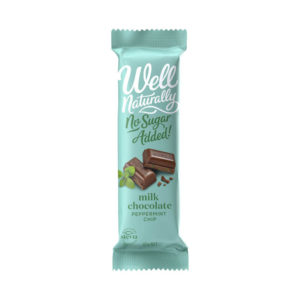
These are definitely on the 'occasional treat' side of the scale, marketed as a healthy chocolate bar option. Now they come in standard 45g bars - about normal when compared to similar types of bars and confectionery.
However, looking at the nutrition label, you'll see that according to the manufacturer, the package contains 3 servings. The suggested serving size is just 15g.
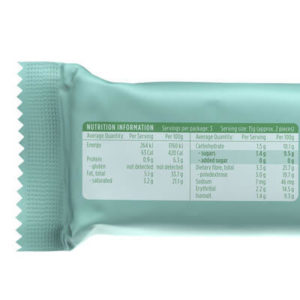
You see, manufacturers can pretty much decide on any serving size that they like. Obviously, the smaller the serving size, the lower the calorie, kilojoule and fat content they can declare.
When marketing your product to the weight-conscious, this can be a very useful tactic.
For the most part, brands choose to list their serving size as 1 full bar. However, as always, it pays to check the label.
Muesli bars and carbs | Checking the carbohydrate content in supermarket snack bars
When it comes to snack bars and carbohydrates there are two schools of thought. Either:
Active people who're looking for workout fuel should opt for a higher carb-content bar
Non-active people, or those who prefer fewer carbohydrates in their diet, can choose a lower carb option.
Personally, I go the higher carb route, since I find muesli bars function best as pre-workout snacks.
How carbohydrates affect marketing in muesli bars and snack bars
With keto, paleo and a whole manner of other diet trends exploding, brands market their products in creative ways.
Over the last decade, there has certainly been a push on the 'carbs are bad' mentality. And brands have honed in on this. As a result, many choose to shout their 'low-carb' choices from the rooftops.
Are they really low carb though?
Once again, it comes down to labelling. Now I'm not suggesting any brands are being unscrupulous, I'm just pointing things out as I believe it best everyone is aware.
Let's look at Noshu's Coconut Bliss Indulgence Bars
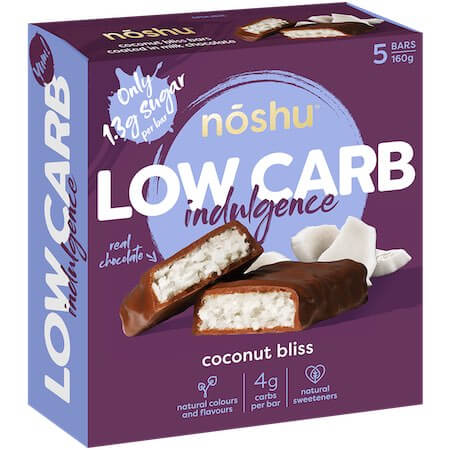
What's the largest writing on the box? Yip, LOW CARB.
Let's look at the nutrition label: (taken from Noshu's website)
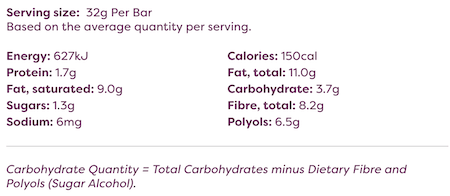
Notice anything?
Carbohydrates listed as 3.7g. However, the total fibre is 8.2g.
Now, you may or may not know that dietary fibre is indeed a form of carbohydrate. So how can there be more fibre than carbohydrates?
Simple answer, there can't. Except that last sentence explains something important.
They're stating carbohydrate quantity shown is essentially the total carbohydrates with fibre and sugar alcohols taken off.
Now again, let's be clear, this is allowed and perfectly legal as per current labelling regulations.
Is it fair? I'll let you decide.
There's a whole lot of confusion regarding dietary fibre and sugar alcohols and where they should or shouldn't be labelled as carbohydrates. I'll leave that discussion for another time.
Either way, a bar with the same nutritional profile might be labelled by another brand as containing 18.4g carbohydrate.
However, here it's being marketed as a 'low carb' option. As per labelling laws, it is.
High Carbohydrate Supermarket Muesli Bar Options
As mentioned earlier, personally I prefer the bars with higher carbs since they fit in with my training and general sports diet.
Those in my survey with the highest carb content are:
All Natural Bakery's range of Oat Slices:
However, we should note that these bars are among the largest available, coming in at 100g serving sizes each.
If you're looking for a more 'standard size' high carbohydrate granola bar, then the top 5 choices are:
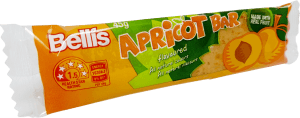
Bellis Apricot Bar
Carbohydrates: 37.4g
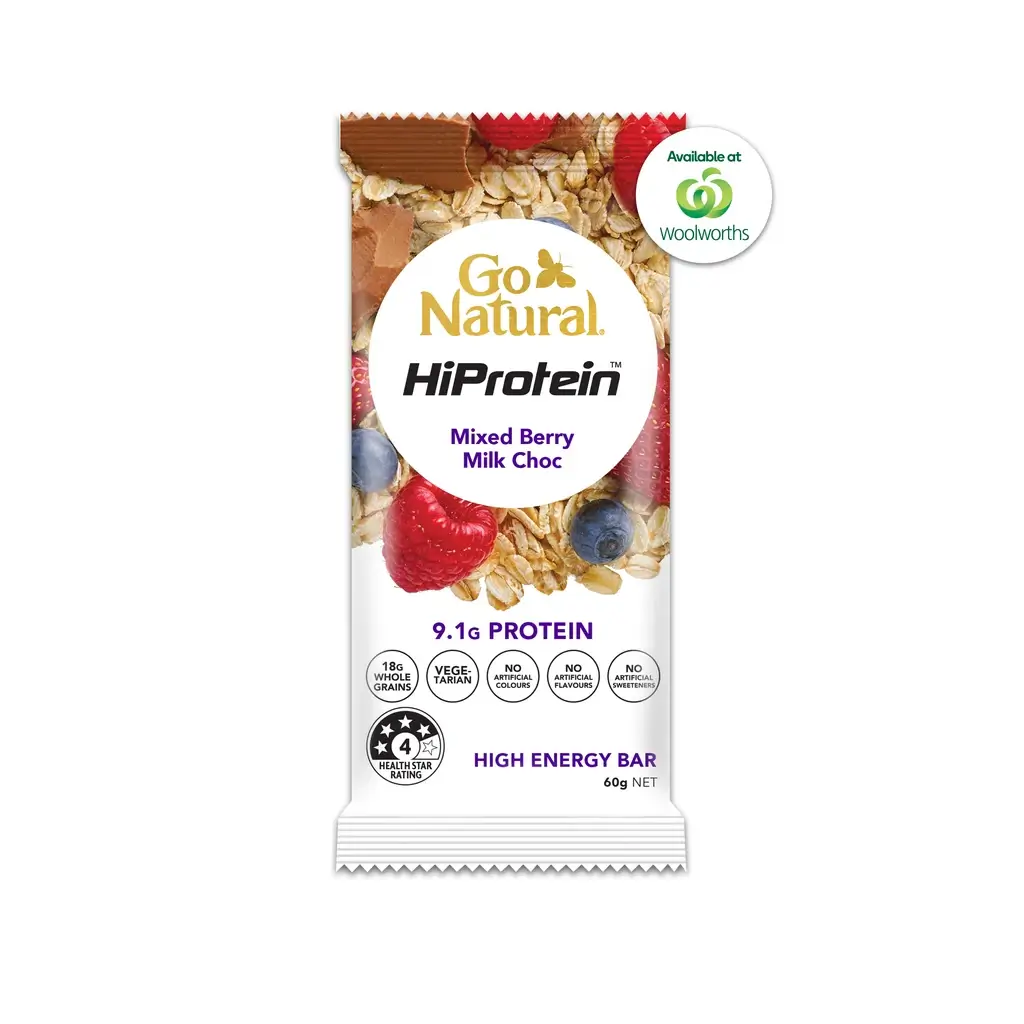
Go Natural HiProtein Mixed Berry Milk Choc High Energy Bar
Carbohydrates: 35.8g
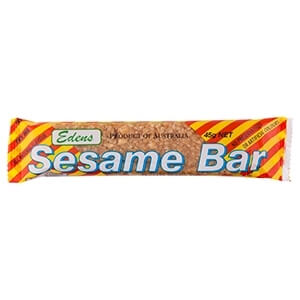
Edens Sesame Bar
Carbohydrates: 27.8g
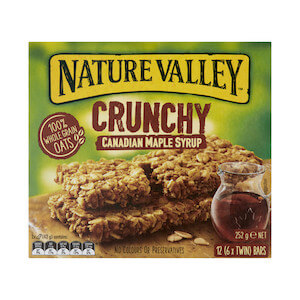
Nature Valley Crunchy Canadian Maple Syrup Oat Bar
Carbohydrates: 27.1g
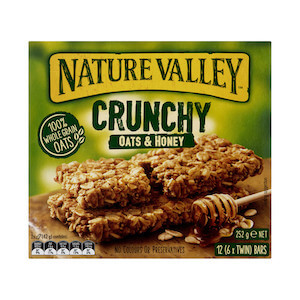
Nature Valley Crunchy Oats & Honey Oat Bar
Carbohydrates: 27.1g
Low Carbohydrate Supermarket Snack Bar Options
In my survey of over 240 supermarket muesli and snack bar products, these were the top 5 low carb choices:
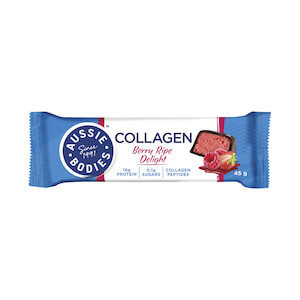
Aussie Bodies Collagen Berry Ripe Delite
Carbohydrates: 0.6g
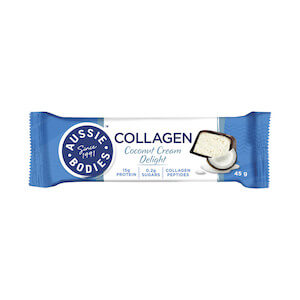
Aussie Bodies Shine Collagen Coconut Delite
Carbohydrates: 1.4g
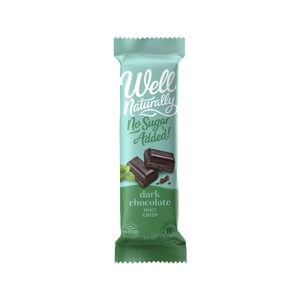
Well Naturally No Sugar Added Dark Chocolate Mint Crisp Bar
Carbohydrates: 1.5g
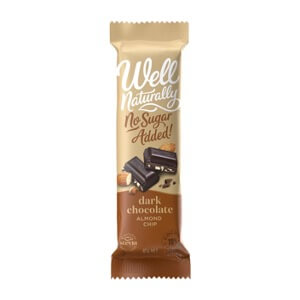
Well Naturally No Sugar Added Dark Chocolate Almond Chip Bar
Carbohydrates: 1.8g
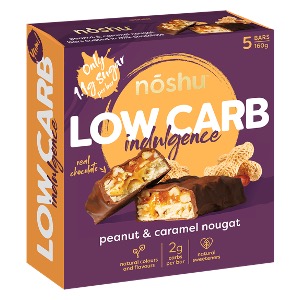
Noshu Low Carb Peanut and Caramel Nougat Indulgence Bar
Carbohydrates: 2.0g
Energy content of shop-bought muesli, granola, nut and snack bars
Now as you might imagine, the calorie (or kilojoule) content in muesli bars vary widely. Again, some may prefer a higher energy option, to provide fuel for gym sessions. Others may look for a bar lower in calories and kilojoules.
As a general rule, if you want a higher-energy bar, those containing nuts & seeds make a good choice.
Again, due to their larger serving size of 100g, All Natural Bakery's Oat Slices top the list.
However, other honourable mentions for high calories or kilojoules include:
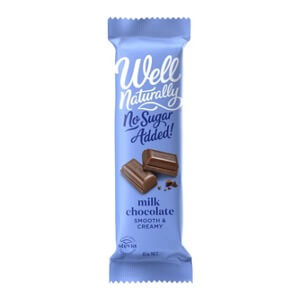
Well Naturally No Sugar Added Milk Chocolate Smooth & Creamy Bar
1116 kJ | 267 kcal
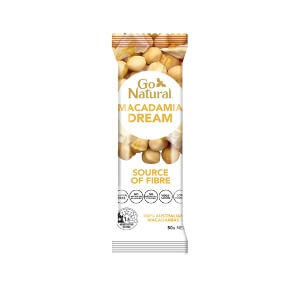
Go Natural Macadamia Dream Natural Bar
1110 kJ | 265 kcal
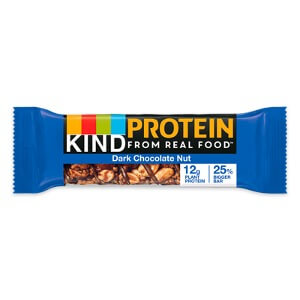
KIND Dark Chocolate Nut Protein Bar
1104 kJ | 264 kcal
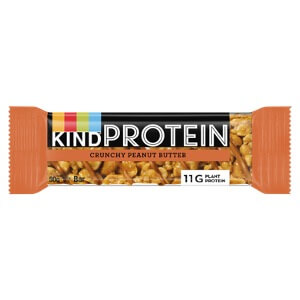
KIND Crunchy Peanut Butter Protein Bar
1076 kJ | 257 kcal
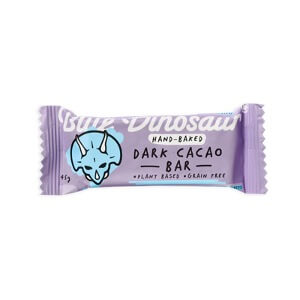
Blue Dinosaur Hand-Baked Dark Cacao Snack Bar
1040 kJ | 249 kcal
Low-Calorie and Kilojoule Snack Bar Choices
If low-energy snacks are more what you're after, these are the best choices:
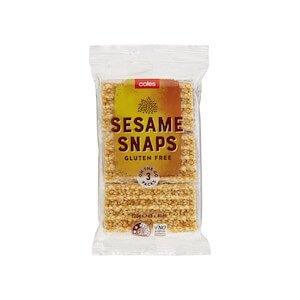
Coles Sesame Snap
217 kJ | 52 kcal
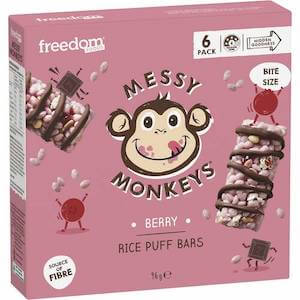
Freedom Foods Messy Monkeys Berry Rice Puff Bar
290 kJ | 69 kcal
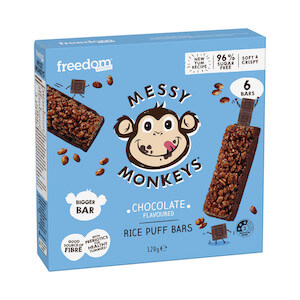
Freedom Foods Messy Monkeys Choc Rice Puff Bar
290 kJ | 69 kcal
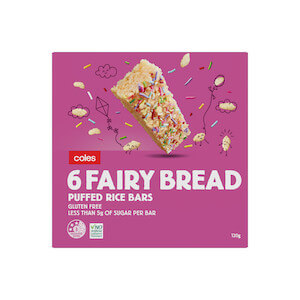
Coles Fairy Bread Puffed Rice Bar
298 kJ | 71 kcal
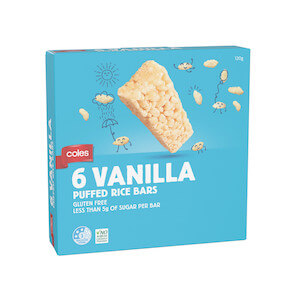
Coles Vanilla Puffed Rice Bar
300 kJ | 72 kcal
That being said, all these bars are among the smallest surveyed.
The Sesame Snap is only a 10g serving, while the others are 20g. Something else for you to consider when making a healthy choice.
Saturated fat content - lower makes a healthy muesli bar
Now it's fair to say saturated fat isn't good for us. It diminishes heart health and most of us get more than enough in our diets.
When it comes to snack bars, looking for those with lower saturated fat content makes sense:
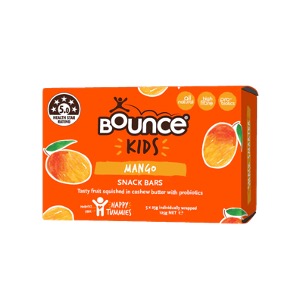
Bounce Kids Mango Snack Bar
Saturated Fat: 0.2g
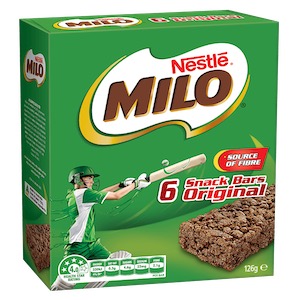
Nestle Milo Snack Bar Original
Saturated Fat: 0.3g
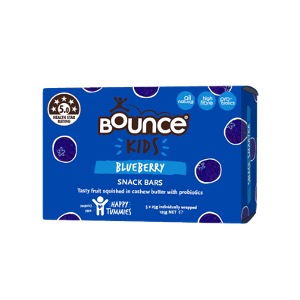
Bounce Kids Blueberry Snack Bar
Saturated Fat: 0.3g

Coles Sesame Snap
Saturated Fat: 0.4g
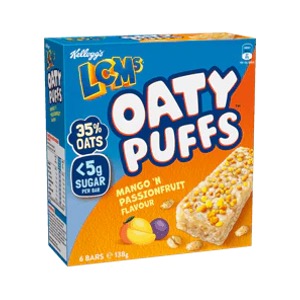
Kellogg's LCMs Mango 'N Passionfruit Flavour Oaty Puffs Chewy Snack Bar
Saturated Fat: 0.4g
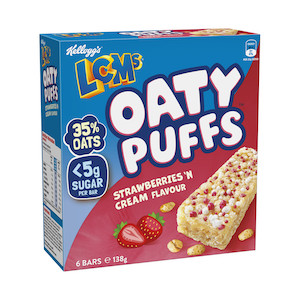
Kellogg's LCMs Strawberries 'N Cream Flavour Oaty Puffs Chewy Snack Bar
Saturated Fat: 0.4g
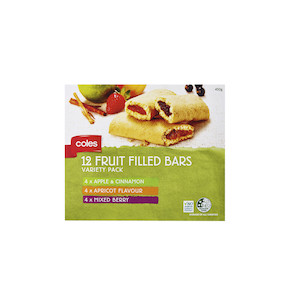
Coles Fruit Filled Bar
Saturated Fat: 0.4g
At the other end of the scale, snack bars with the highest levels of saturated fat include:
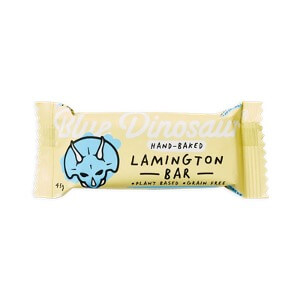
Blue Dinosaur Hand-Baked Lamington Snack Bar
Saturated Fat: 14.4g
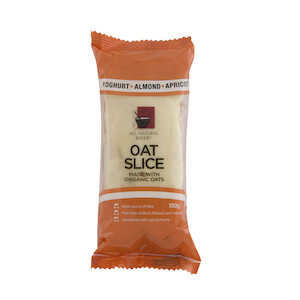
All Natural Bakery Yoghurt, Almond & Apricot Oat Slice
Saturated Fat: 14.1g

All Natural Bakery Macadamia & Apricot Oat Slice
Saturated Fat: 13.9g
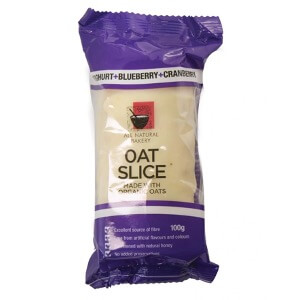
All Natural Bakery Yoghurt, Blueberry & Cranberry Oat Slice
Saturated Fat: 13.8g
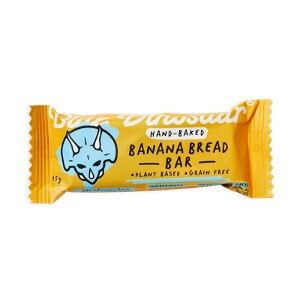
Blue Dinosaur Hand-Baked Banana Bread Snack Bar
Saturated Fat: 13.7g
Get the free comparison
Nutritional information for 243 different muesli bars available in your local supermarket
Sugars in muesli bars
Muesli, granola and Fruit & nut bars with dried fruit will add natural sugars. Additionally, you'll also benefit from added fibre and micronutrients. On the contrary, added sugars just add sweetness and calories, without much in the way of nutrition.
Having a sweet tooth is okay, the trick is not to overdo it.
In general, look for snack bars with less than 10g sugar per bar.
Some of the best low-sugar muesli bar options:

Aussie Bodies Collagen Berry Ripe Delite
Sugars: 0.1g

Aussie Bodies Shine Collagen Coconut Delite
Sugars: 0.2g

Well Naturally No Sugar Added Dark Chocolate Mint Crisp Bar
Sugars: 0.3g
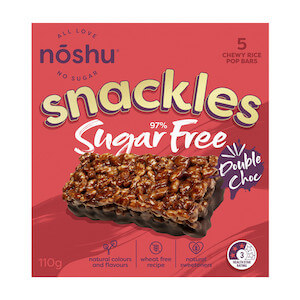
Noshu Double Choc Snackles Bar
Sugars: 0.5g
Meanwhile, those bars with the highest sugar content:

Bellis Apricot Bar
Sugars: 26.7g
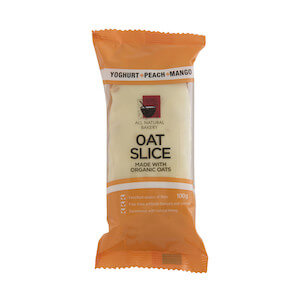
All Natural Bakery Yoghurt Peach Mango Oat Slice
Sugars: 23.1g

All Natural Bakery Yoghurt, Blueberry & Cranberry Oat Slice
Sugars: 21.9g

Edens Sesame Bar
Sugars: 20.8g
Protein content of Supermarket Snack Bars
Some brands prefer to adopt a more 'protein-forward' approach to their marketing.
What's the difference between a muesli bar vs a granola bar vs a protein bar?
In a word, marketing
There are quite a lot of grey areas when it comes to defining exactly what a muesli bar should be. Likewise, you might think of protein bars as those intensely dense, chewy items found in supplement stores.
Either way, some supermarket snack bar options like to declare the word 'protein' quite prominently on their packaging.
I'll do a nutrition survey on the more traditional supplement-type protein bars soon.
Snack bars with the highest protein content on the supermarket shelves:

Aussie Bodies Collagen Berry Ripe Delite
Protein: 16.2g

Aussie Bodies Shine Collagen Coconut Delite
Protein: 15.8g

KIND Dark Chocolate Nut Protein Bar
Protein: 11.5g

KIND Crunchy Peanut Butter Protein Bar
Protein: 11.5g
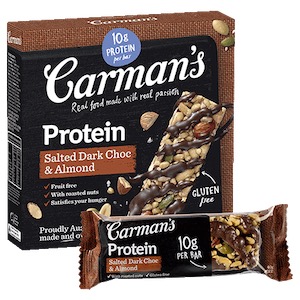
Carman's Dark Choc & Almond Protein Bar
Protein: 11.1g
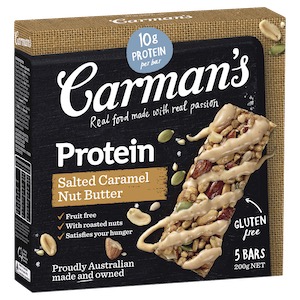
Carman's Salted Caramel Nut Butter Protein Bar
Protein: 11.1g
READ ALSO: Fuelling up before exercise
Fibre content and healthy muesli bar options
As a general rule, most of us don't get enough fibre in our diet. Fibre is great for our digestive health and generally makes food more filling. In essence, it slows down how our bodies digest it. As a result, we feel fuller for longer.
'Healthy' muesli bars which contain more than 50% whole grains, fruit, seeds and nuts will naturally contain more fibre. In addition, some bars contain added fibre in the form of sweeteners and bulking agents.
If satiety is what you're after, look for snack bars higher in dietary fibre*, such as:

Well Naturally No Sugar Added Milk Chocolate Smooth & Creamy Bar
Dietary fibre: 10.8g

Well Naturally No Sugar Added Dark Chocolate Almond Chip Bar
Dietary fibre: 10.8g
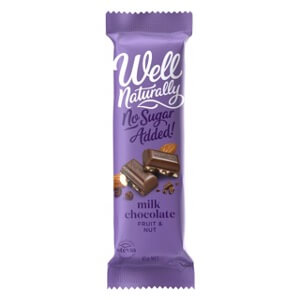
Well Naturally No Sugar Added Milk Chocolate Fruit & Nut
Dietary fibre: 10.2g
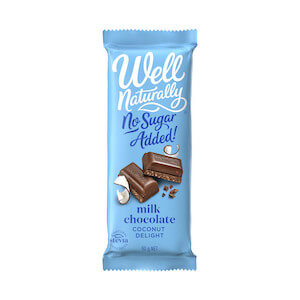
Well Naturally No Sugar Added Milk Chocolate Coconut Delight Bar
Dietary fibre: 10.2g

Well Naturally No Sugar Added Dark Chocolate Mint Crisp Bar
Dietary fibre: 10.2g

Noshu Low Carb Cherry and Coconut Indulgence Bar
Dietary fibre: 10.1g
*DISCLAIMER: 21 out of the 243 bars surveyed had no value for dietary fibre listed. These 21 bars were excluded from this particular ranking.
A note about fibre in pre-workout snacks
A word of caution when it comes to choosing high-fibre muesli bars. If you're using granola bars predominantly as pre-workout options then you may prefer to look at a lower fibre option. In particular, if you snack on bars close to, or immediately before, your training session.
High fibre foods immediately prior to intense workouts can lead to digestive discomfort and ultimately inhibit performance.
In this case, a better strategy would be to adopt low-fibre snack options before your session and refuel with higher fibre foods during the rest of the day.
Sodium Content in Store-Bought Muesli Snack Bars
You'll more than likely know that too much sodium is bad for our health.
Sodium (or salt) comes in one form or another in most processed foods. And that includes our beloved snack bars.
Bear in mind, not all sodium in a bar necessarily comes from added salt. Some ingredients have natural variations in the amount of sodium they contain.
Supermarket Snack Bars with the Lowest Sodium Content
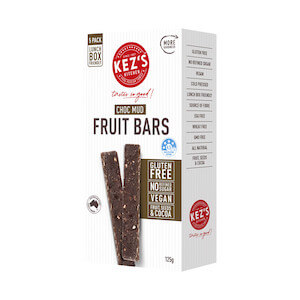
Kez's Kitchen Choc Mud Fruit Bars
Sodium: 1mg

Coles Sesame Snap
Sodium: 1mg
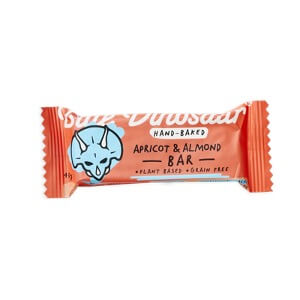
Blue Dinosaur Hand-Baked Apricot & Almond Snack Bar
Sodium: 2mg

Blue Dinosaur Hand-Baked Dark Cacao Snack Bar
Sodium: 2mg
Get the free comparison
Nutritional information for 243 different muesli bars available in your local supermarket
Overall, What is the Best Muesli Bar? Using the Health Star Rating to decide
By this point, you might be confused. There's so much to take into account. You want healthy, but you want energy, but the fat needs to be good fat.
If only there was a way to compare the overall nutrition and rank muesli bars based on how healthy they are.
Perhaps there is. Meet the Health Star Rating System.
What is the Health Star Rating System?
I've explained a bit about the health star system in my other blog post: Healthy Eating on a Budget: Guide to Saving Money at the Supermarket
In essence, the Health Star Rating System in Australia is a government initiative to help consumers compare foods.

Health Star Ratings on packaging can help consumers compare & decide which product is healthier. Image courtesy of www.healthstarrating.gov.au
There are a few key points to it:
Health Star Ratings are a quick and easy way to compare the nutritional profile of similar packaged foods.
The Health Star Ratings are voluntary and range from ½ to five stars.
The more stars, the healthier the food.
Health Star Ratings are calculated using strict guidelines.
Health Star Ratings of Muesli, Granola, Nut and Snack Bars - the healthy options
As mentioned, the Health Star Rating System is completely voluntary. Manufacturers can choose to display the ratings on their products or not.
So to give you a fair comparison, I've got the Health Star Rating algorithm to calculate the rankings for all 243 products* surveyed.
You can use this to decide if that muesli bar you're about to buy is healthy, or not.
*21 of the products surveyed had no value listed for dietary fibre and/or sugar. These products were excluded since no Health Star Rating could be calculated for them.
The overall winner of the healthiest muesli bar award:
Carman's Raspberry & Pistachio Seed & Plant Protein Bar
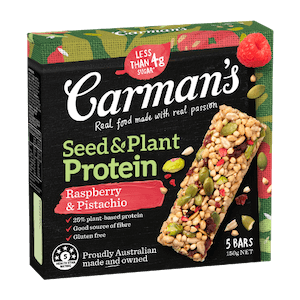
This was the only product on the list that obtained the full 5 out of 5 stars.
The following 13 muesli bars obtained a very respectable 4.5 stars, so you can definitely consider them healthy too.
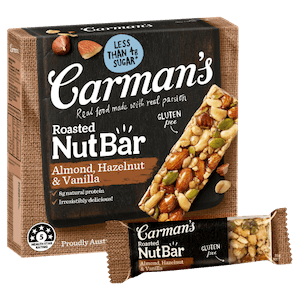
Carman's Almond, Hazelnut & Vanilla Roasted Nut Bar
35g
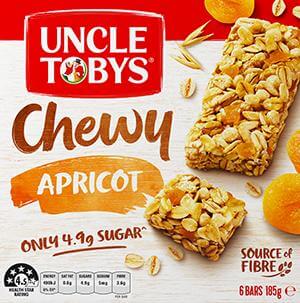
Uncle Tobys Chewy Apricot Muesli Bar
31.3g
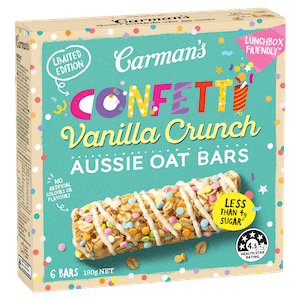
Carman's Confetti Vanilla Crunch Aussie Oat Bar
30g
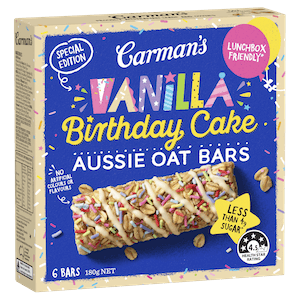
Carman's Vanilla Birthday Cake Aussie Oat Bar
30g
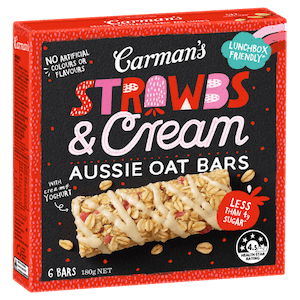
Carman's Strawbs & Cream Aussie Oat Bar
30g
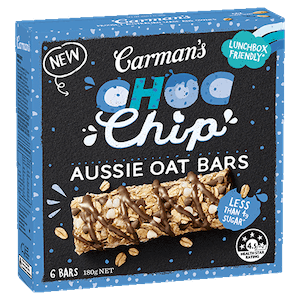
Carman's Choc Chip Aussie Oat Bar
30g
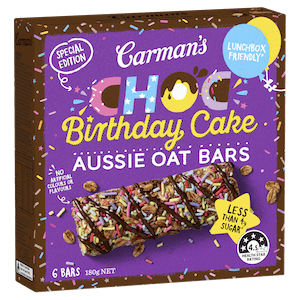
Carman's Choc Birthday Cake Aussie Oat Bar
30g
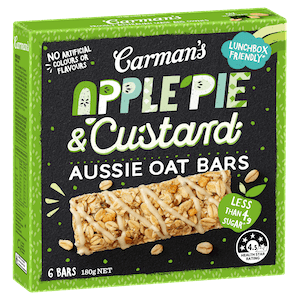
Carman's Apple Pie & Custard Aussie Oat Bar
30g
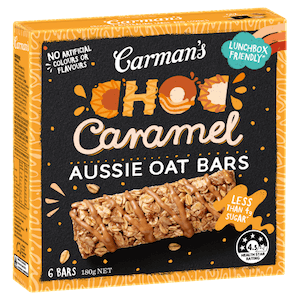
Carman's Choc Caramel Aussie Oat Bar
30g

Bounce Kids Mango Snack Bar
25g

Bounce Kids Blueberry Snack Bar
25g
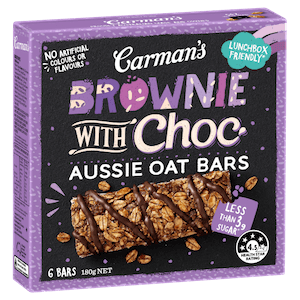
Carman's Brownie with Choc Aussie Oat Bar
30g

Nice & Natural Salted Caramel Protein Nut Bars with 3 Superseeds
33g
Get the free comparison
Nutritional information for 243 different muesli bars available in your local supermarket
Thoughts, Comments, Ideas and Reactions
Well, what did you think?
Were you surprised at the winner, or were you shocked that you're favourite didn't make the list?
Perhaps you have an idea for a future nutrition comparison you'd like to see?
In any case, drop me a comment below to let me know your thoughts.

More Supermarket Product Comparisons
